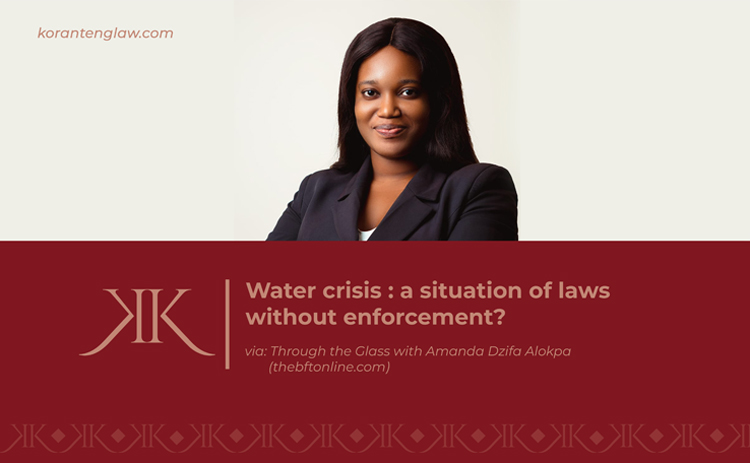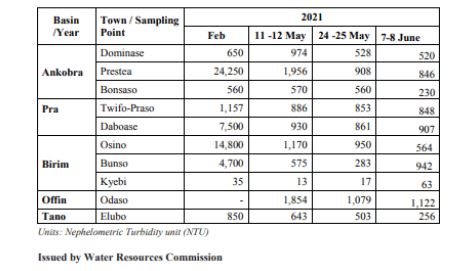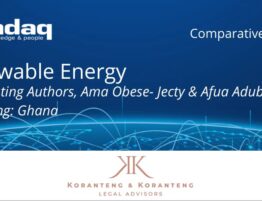
Water crisis: a situation of laws without enforcement?
Water is life, and its importance cannot be denied. From nutrition to medication, it cuts across several spheres of our existence. Domestically, the discourse on water protection has been minimal, but now – more crucially than ever – the discourse on water protection needs to be increased for our own safety and for posterity.
Ghana’s Water Crisis
The report of the Water Resources Commission (WRC) on the state of water-bodies in illegal mining areas of Ghana as at June 2021 reveals the turbidity levels of water-bodies in those areas. Turbidity, as a good measure of water quality, is a measure of the degree to which water loses its transparency due to the presence of suspended articles. Per the report, the acceptable turbidity value for drinking water is 5 Nephelometric Turbidity Unit (NTU), while values of 80 to 150 NTU are acceptable for other water uses as appropriate. The table below extracted from the said report reveals the turbidity levels of the water-bodies stated therein.

The combined sources of water pollution in Ghana are gradually making Ghana a water-insecure country. It has been predicted that Ghana may import water by 2030 if illegal mining is not banned. The Ghana Water Company Limited (GWCL) has also warned that Ghana may have to import large quantities of water soon if Ghana’s water-bodies are continually polluted through illegal mining activities.
According to the Communications Director of GWCL, the effect of illegal mining has increased GWCL’s operational cost because it has had to increase the quantity of chemicals used in treating water for production – mainly due to high turbidity levels. In 2018, the then Minister for Lands & Natural Resources reiterated the possibility of Ghana importing water by 2030 if the negative practices destroying Ghana’s water-bodies are not curbed. ffffhhhhhhoon jb import large quantities warned that stated that, by the Minister of Lands and naturla and their implementati
Toxic chemicals such as mercury are also released into water-bodies, endangering aquatic life. The fish that survive the deadly habitat are eventually harvested and consumed. Equally, agricultural communities in which galamsey takes place heavily rely on these water-bodies for farming. It is suspected that kidney-failure and the birth of newborn babies with deformities are on the rise in mining communities due to the consumption of polluted water.
The Head of Kwame Nkrumah University of Science & Technology (KNUST) School of Medicine and Dentistry, Dr. Paul Ossei Sampene, observed that illegal mining activities which contaminate river-bodies and food crops have devastating long-term effects on human health; and have significantly contributed to the strange diseases and birth-defects which have overwhelmed Ghana’s health facilities. This, he said, is largely due to the heavy metal pollution in the food chain that ends up in the human body.
The principal question to be asked is whether there are laws that protect our water-bodies from pollution; and which state agencies are responsible for the implementation of such laws.
Domestic Legislation Protecting Water-bodies
The Water Resources Commission was established by the Water Resources Commission Act, 1996 (Act 522) with the primary function of regulating and managing the utilisation of water resources in Ghana, and for the coordination of any policies in relation to them. Among the WRC’s functions are: granting of water rights; the proposal of comprehensive plans for conservation, improvement and development of water resources; to advise government on any matter likely to have an adverse effect on Ghana’s water resources; and also to advise pollution control agencies on matters concerning management and control of water resources pollution.
Section 24 of Act 522 provides that – except in accordance with provisions of the Act, or with approval of the Environmental Protection Agency (EPA) – a person who interferes with, alters the flow of, or pollutes or fouls a water resource beyond the level that the EPA may prescribe, commits an offence and is liable to a fine not exceeding five hundred penalty units (GH¢6,000) or a term of imprisonment not exceeding two years or to both.
The Act also gives the WRC power to grant water rights. Water rights refer to the legal right to use water from a specified source – e.g., a river, stream, pond or source of groundwater. It can also be defined as the right to use a portion of the public’s water supply. A grant of water rights is subject to parliamentary ratification. Parliament may, by resolution supported by the votes of not less than two-thirds of all the members of parliament, grant an exemption from the requirement of parliamentary ratification for certain classes of water rights.
Section 15 of Act 522 empowers the WRC – where it appears to it that the use of a water resource for any purpose at a particular place poses a serious threat to the environment or to public health – to serve on the user of that water resource an enforcement notice requiring the user to take the necessary steps to prevent or stop the activities.
It may interest you to know that under Act 522, when the Minister for Works and Housing is satisfied that special measures are necessary to protect water resources in or derived from an area, the minister may by an Executive Instrument (EI) declare that area or a part of it to be classified as a protected catchment area. Also, the minister may by notice in the Gazette declare that a water emergency exists in an area where the minister is satisfied that a serious water-deficiency exists; or is threatened by reason of drought, an accident, or unforeseen circumstances. This declaration is to be made after the minister has consulted with the District Assembly of the said area.
Additionally, the District Assemblies are to be supported by the Community Water and Sanitation Agency in promoting the sustainability of safe water supply and related sanitation services in rural areas and small towns. The enabling legislation of the agency is the Community Water and Sanitation Agency Act, 1998 (Act 564) which sets out a plethora of functions for the agency, with the object of providing safe water to rural communities and small towns.
Furthermore, the Water Use Regulations, 2001 (L.I 1692) provides a list of activities for which a permit from the WRC may be obtained. The list comprises domestic water use, commercial water use, municipal water use, industrial water use, agricultural water use, power generation water use, water transportation water use, fisheries (aquaculture) use, environmental water use, recreational water use and underwater (wood) harvesting.
Regulation 1 of L.I 1692 states that a person may obtain a permit from the WRC to undertake any of the above listed activities. The phrasing of Regulation 1 creates the impression that getting a permit is optional.
Where an application for a permit has been made, the WRC in considering such application shall be guided by the prevailing water policy, the domestic water use, and any other water use that fulfils the goals of national socio-economic development.
Also, where the WRC in consultation with the EPA considers a proposed water use to constitute a use requiring an Environmental Impact Assessment (EIA), the applicant shall attach to the application evidence that an EIA has been approved by the EPA. Where in the EPA’s opinion the proposed or existing water use requires an environmental management plan, that requirement shall be one of the conditions for granting the water-use permit. A permit granted under L.I. 1692 shall be for the period specified within the permit and may be renewed. An application for renewal of a permit shall be made to the Commission not later than 90 days before expiration of the permit.
In addition to the above, the Drilling Licence and Groundwater Development Regulations, 2006 (L.I 1827), make it mandatory for a person to obtain a water drilling licence from the WRC for constructing a well for the abstraction or monitoring of groundwater, or for research. The drilling licence is to be obtained by the company responsible for drilling the well.
To avoid or abate groundwater pollution, the environmental protection requirements of L.I. 1827 prohibit a drilling company from constructing a well in a manner that would contaminate or pollute groundwater or an aquifer. The WRC is empowered to inspect the well site through its authorised officer to ensure compliance with the Regulations. It is an offence for a person (a drilling company/drilling contractor) to carry out or to allow the carrying out of a well-drilling activity for the abstraction of water without a licence from the WRC.
It is also an offence under L.I. 1827 for a person to conduct drilling activities contrary to the conditions of his or her licence. An offender under L.I. 1827, on summary conviction, shall be liable to a fine of not more than 250 penalty units (GH¢3,000) or imprisonment for a term of not more than 2 years or to both.
The Environmental Protection Agency Act, 1994 (Act 490) makes the EPA responsible for prescribing standards and guidelines relating to water and other forms of environmental pollution, including the discharge of waste and control of toxic substances. The Environmental Assessment Regulations, 1999 (L.I 1652) outlines undertakings for which an EIA is mandatory. The list includes mining, petroleum, waste treatment and disposal, water supply and agriculture, among others. Watershed reserves, which are areas of erodible soils that are protected from development and retained in forest cover to provide lon-term water supply, are also considered to be environmentally-sensitive areas.
To advance the protection of water-courses, an EIA that includes reclamation plans is required for mining and other extractive industry. In mining and other extractive industries, reclamation involves the removal of equipment and unwanted structures – and modifying the mine site or land to an ecologically functional or economically usable state, with the goal of restoring the site or area’s topography.
An environmental permit is also required for agriculture and its related activities; mining (including milling, quarrying and oil wells); manufacturing; non-metallic mineral products; wholesale trade and accommodation; and food and beverages. L.I.1652 breaks down the activities that fall under these very broad heading or categories. A holistic reading of L.I. 1652 suggests that the legal requirements such as the EIA and Environmental Permit are measures to protect water sources and the environment in general from destruction or pollution.
Additionally, for the protection of watershed and forest reserves, the Forestry Commission Act, 1999 (Act 571) makes the Forestry Commission responsible for managing Ghana’s reserves or protected areas by monitoring the condition and extent of the nation’s forest and wildlife resources, as well as properly planning for the protection and development of forest resources in a sustainable manner.
Minerals and Mining Act, 2006
Notwithstanding all these seemingly advancing provisions on the protection of water-bodies, section 17 of the Minerals and Mining Act, 2006 (Act 703) permits the holder of mineral rights to obtain, divert, impound, convey and use water from a river, stream, underground reservoir or watercourse within the land subject to the mineral rights. This very extensive permission is however subject to the mineral rights’ holder obtaining the requisite approvals or licences under the Water Resources Commission Act, 1996 (Act 552).
This means that a licenced mineral rights holder can divert a water-course to the disadvantage of the immediate and wider community. This provision does not permit mining in rivers, and the law envisages legal mining without the incidence of water pollution. That notwithstanding, the possibility of polluting water-courses in the exercise of the wide permission granted under section 17 of Act 703 cannot be completely excluded. The large-scale pollution of water-courses oiver the past few years appears to have stemmed from illegal mining.
International Conventions
On the international front, Ghana officially became a party to the 1992 Water Convention and the 1997 Watercourses Convention on the 20th of September 2020. The 1992 Water Convention is the abridged title of the 1992 UNECE Convention on the Protection and Use of Transboundary Watercourses and International Lakes, which is serviced by the United Nations Economic Commission for Europe, while the 1997 Watercourses Convention is the abridged title of the United Nations Convention on the Law of the Non-Navigational Uses of International Watercourses.
Both conventions include provisions that border on principles such as the obligation not to cause significant harm; equitable and reasonable utilisation; the general obligation to cooperate; notification and response relating to planned measures; protection and preservation of ecosystems; preventing, reducing and controlling pollution; and the regular exchange of data and information between party states that share a transboundary watercourse, as the Conventions cover international watercourses.
Prior to these, Ghana was already a party to the Volta Basin Convention (Convention on the Status of the Volta River and the Establishment of Volta Basin Authority) to which the Heads of State of Mali, Benin, Burkina Faso, Ivory Coast, Ghana, Mali and Togo appended their signature on the 19th of January 2007.
These international legal regimes for water protection are necessary for cooperation between states toward the protection and use of Ghana’s transboundary waters. Considering the difficulties in enforcing global environmental law, it would be best for Ghana to ratify these conventions promptly. Ratification is essential to step-up compliance with these Conventions, to bring our domestic laws in sync with our international obligations, and also to avoid a situation where the country would invoke domestic laws to justify failure to perform its obligation under the Convention.
It is a principle of international law that a state party cannot invoke the provisions of its internal law as a justification for its failure to perform its obligation under an international agreement to which it is a party – such as the 1992 Water Convention and 1997 Watercourses Convention. Ratification of these conventions therefore provides motivation for compliance and also intensifying the enforcement of our domestic laws and implementation of these Conventions.
Regional Concerns
The effect of Ghana’s water bodies’ pollution transcends borders. This is because the Volta, Tano, Bia and Todzie-Aka Rivers also happen to be transboundary river basins. These rivers generate about 80 percent of freshwater flow, of which around 30 percent flows from outside Ghana’s international borders; Togo, Burkina Faso and Ivory Coast. In early 2017, Ivory Coast raised concerns that the Bia River had been polluted by illegal mining activities in Ghana -resulting in a cessation of production and supply of water to its population and civil unrest.
Also, in line with the 1992 Water Convention and 1997 Watercourses Convention, Ghana has an arrangement with Burkina Faso for sharing data on water discharges from the Bagre Dam in Burkina Faso, and on planned measures or developments. This is with respect to the principle of regularly exchanging data and information between party states that share a transboundary water-course.
Enforcement
The United Nations Development Programme noted that: “The availability of water is a concern for some countries. But the scarcity at the heart of the global water crisis is rooted in power, poverty and inequality, not in physical availability”. The people who tend to suffer most are those in communities affected by water pollution – who often happen to be destitute and have no alternatives.
Rooted in the problem of water protection is lack of enforcement for the laws. In respect of the institutional framework for water protection, there are a number of institutions that manage and develop Ghana’s water resources at the policy, organisational and operational levels.
At the policy level, there are the Ministry of Sanitation and Water Resources – which principally works through its Water Directorate; and the Ministry of Local Government and Rural Development. At the organisational level, there are the WRC, Community Water and Sanitation Agency (for rural water supply and sanitation provisions) and GWCL (for urban water supply). At the operational level, there is principally the Metropolitan, Municipal and District Assemblies (MMDAs).
There are also Non-Governmental Organisations (NGOs) and Community Based Organisations (CBOs) which take charge of and coordinate water resources management activities at the lowest level. The efforts of NGOs and CBOs, at best, can be described as supplementary to efforts of the institutions mandated to ensure water protection.
The WRC in July 2022 was adjudged the Most Efficient Regulator in Ghana at the maiden edition of the Public Enterprise League Table organised by the Ministry of Public Enterprise; a testament to its efforts. It is high time the other water protection agencies stepped up their efforts in protecting our water-bodies from pollution by enforcing the laws that empower them. If necessary, the assistance of law enforcement agencies should be sought. Roping-in the assistance of townsfolk to blow the whistle on offenders would also go a long way in protecting our water-bodies from destruction.
Conclusion
With climate change causing disruption to weather patterns, season shifting, extreme weather conditions as well as flood and drought in places which hitherto had no such disasters, guarding against the unavailability of water will be one of the global challenges of our time – especially for Ghana, as it is suffering from the menace of galamsey.
The laws discussed above are not exhaustive but provide a broad perspective on the legal protection afforded water-bodies in Ghana. The goal is that by 2030 Sustainable Development Goal (SDG) 6, Ensuring Access to Water and Sanitation For All, would have been far advanced in many countries. The 2024 general election is fast approaching, and as politicians mount their campaign platforms we should seize the opportunity to ask about their proposed national framework to advance water protection and protect your right to water and sanitation.
Source: thebftonline.com








